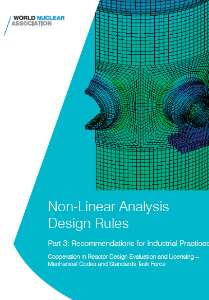Non-Linear Analysis Design Rules
Part 3: Recommendations for Industrial Practices
First Published July 2021
Major design rules in pressure vessel and piping codes are based on the linear elastic approach, which uses stress classification. This approach becomes impractical, however, for complex geometry and load combinations. The use of non-linear analysis at design level is an efficient alternative to the linear elastic approach as it is based on real material behaviour and more accurate deformation criteria and negates the need for stress classification.
Non-Linear Analysis Design Rules Part 3: Recommendations for Industrial Practices is the final report in a series on non-linear analysis design rules, which is built on the assessment of international non-linear analysis benchmark results. It proposes recommendations for industrial practices in non-linear analysis of safety grade reactor components from the initial setting of parameters to the post-processing and interpretation of results. These results are comprised of linear mechanical analysis, plastic analysis, elastic fatigue analysis, and plastic fatigue analysis. The report also recommends that Standard Developing Organizations consider the report’s proposed practices as the basis of future harmonization efforts across mechanical codes and standards.
This report has been produced by the Mechanical Codes and Standards Task Force of the World Nuclear Association’s Cooperation in Reactor Design Evaluation and Licensing (CORDEL) Working Group.
